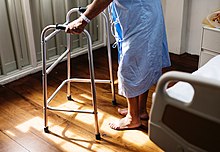
Back متلازمة الوهن العام Arabic Gebrechlichkeit German Gerastenia Finnish Syndrome de fragilité French Ծերունական ասթենիա Armenian フレイル (医学) Japanese Zespół słabości Polish Старческая немощность Russian Sindrom krhkosti Slovenian 衰弱综合症 Chinese
| Frailty syndrome | |
|---|---|
 | |
| A woman supporting herself with a walking frame. | |
| Specialty | Geriatrics |
Frailty is a common and clinically significant grouping of symptoms that occurs in aging and older adults. These symptoms can include decreased physical abilities such as walking, excessive fatigue, and weight and muscle loss leading to declined physical status. In addition, frailty encompasses a decline in both overall physical function and physiologic reserve of organ systems resulting in worse health outcomes for this population.[1][2] This syndrome is associated with increased risk of heart disease, falls, hospitalization, and death.[3][4] In addition, it has been shown that adults living with frailty face more anxiety and depression symptoms than those who do not.[5] The presence of frailty varies based on the assessment technique, however it is estimated that 4-16% of the population over 65 years old is living with frailty.[6]
Frailty can have impacts on public health due to the factors that comprise the syndrome affecting physical and mental health outcomes. There are several ways to identify, prevent, and mitigate the prevalence of frailty and the evaluation of frailty can be done through clinical assessments created to combine recognized signs and symptoms of frailty.
- ^ "Guidelines on Integrated Care for Older People (ICOPE): Guidance for Person-Centred Assessment and Pathways in Primary Care". WHO Clinical Consortium on Healthy Ageing: Topic focus: frailty and intrinsic capacity: Report of consortium meeting 1–2 December 2016 in Geneva, Switzerland (PDF) (Report). World Health Organization. 2017. hdl:10665/272437/WHO-FWC-ALC-17.2-eng. WHO/FWC/ALC/17.2.
- ^ Whitson HE, Cohen HJ, Schmader KE, Morey MC, Kuchel G, Colon-Emeric CS (August 2018). "Physical Resilience: Not Simply the Opposite of Frailty". Journal of the American Geriatrics Society. 66 (8): 1459–61. doi:10.1111/jgs.15233. PMC 6157007. PMID 29577234.
- ^ Cite error: The named reference
Allison_2021was invoked but never defined (see the help page). - ^ "How to avoid frailty and stay strong as you age". www.heart.org. Retrieved 2024-07-25.
- ^ Ní Mhaoláin AM, Fan CW, Romero-Ortuno R, Cogan L, Cunningham C, Kenny RA, et al. (August 2012). "Frailty, depression, and anxiety in later life". International Psychogeriatrics. 24 (8): 1265–74. doi:10.1017/S1041610211002110. hdl:2262/67243. PMID 22333477.
- ^ Waltson JD (June 12, 2023). "Frailty". UpToDate. Retrieved July 26, 2024.